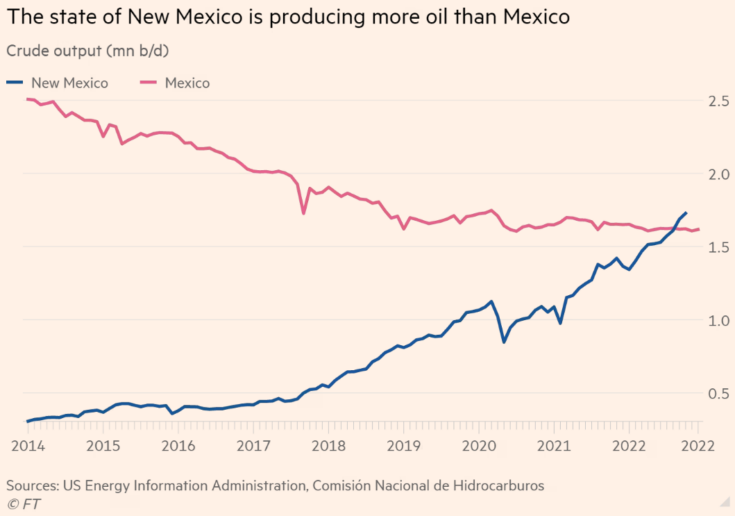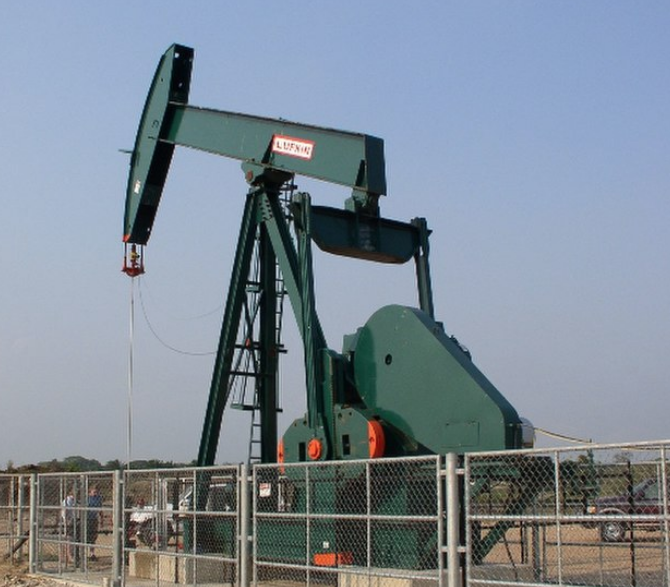When non-economists discuss the relative wealth of nations, they have a tendency to focus on each country’s endowment of natural resources. But there’s actually not much evidence that natural resources play a big role, except in a few cases of countries combining low populations with unusually large resource endowments (Kuwait, UAE, Qatar, etc.). Consider this graph from the Financial Times:

That’s quite a striking turnaround, which requires some explanation. A casual reader might assume that New Mexico is unusually well-endowed with oil. In fact, Mexico likely has much larger oil reserves. Instead, New Mexico has aggressively utilized new technologies such as fracking, while Mexican production has stagnated as a result of nationalistic economic policies that favor the highly inefficient state-owned Pemex. More generally, America has not become the world’s largest oil producer because we have unusually large oil reserves, rather we are willing to engage in fracking while many other places (including much of Europe) have banned fracking, or have economic policies that discourage foreign investment.
I often argue that Texas has economic policies that are especially well suited to promoting economic growth, and as a result its population has increased rapidly during recent decades. One response is that Texas is “lucky”, as it is unusually well endowed with oil. But does that argument actually hold up on closer inspection?
When I was young, New Mexico was rarely cited as a major oil producer. Instead, states like Texas, Louisiana, Oklahoma, California and Alaska were the major producers. Since then, fracking has pushed New Mexico and North Dakota into the major leagues, while California and Alaska have slipped a bit as tight environmental regulations make new drilling difficult. So how has population growth fared in these oil states?
Since the 2020 census, California, Louisiana and New Mexico have lost population. North Dakota and Alaska are roughly flat, which means they’ve grown less than the overall US. Oklahoma is up about 1.5%, a bit more than the US (which rose 0.6%), while Texas saw its population soar by roughly 3%. Indeed nearly half of America’s population growth since 2020 has occurred in Texas.
If Texas’s rapid population growth were due to oil, then you’d also expect lots of growth in places like New Mexico and Louisiana. But those states have a less favorable set of government policies. For instance, both places have state income taxes.
The Dakotas provide another example. North Dakota has lots of oil and South Dakota does not. And yet it is South Dakota that has seen rapid population growth in recent years, indeed last year it was at the fifth highest rate among US states. And South Dakota is one of the few states with no (state) income tax.
To summarize, Mexico does not even have economic policies that encourage energy production, much less economic growth. New Mexico does have policies that encourage energy production. But Texas has policies that encourage energy production and also policies that encourage economic growth in a wide range of other industries.
PS. Which country has more resources, Russia or the Netherlands? Russia has plenty of land, but doesn’t use it wisely. The Netherlands doesn’t have much land—so they made some more.


READER COMMENTS
TMC
Feb 12 2023 at 1:50am
“If Texas’s rapid population growth were due to oil, then you’d also expect lots of growth in places like New Mexico and Louisiana” No. Just comparatively good government.
Fazal Majid
Feb 12 2023 at 2:55am
Then there is Dutch Disease, which suggests natural resources may even have a negative effect on human capital and the rest of the economy, and how oil in Russia, the Middle East, Central Asia and Africa fostered resource-extraction kleptocracies.
Scott Sumner
Feb 12 2023 at 4:27am
Good point, although ironically the Netherlands is not a good example of the Dutch disease. It is relatively well run and its gas industry did not seriously damage its highly competitive exports in manufacturing and agriculture.
john hare
Feb 12 2023 at 4:30am
When I think lack of natural resources and economic growth, I think of Japan in the later half of the 20th. What you have is important. What you do with what you have is crucial.
JoeF
Feb 12 2023 at 8:34am
Oil comes in pretty handy if there’s a conflict though
Jon Murphy
Feb 12 2023 at 8:43am
All the more reason to be smart, foster trade and alliances, and not focus on foolishness like protectionism and industrial planning.
Jon Murphy
Feb 12 2023 at 9:28am
I think, as counterintuitive as this is, an open question as to whether natural resources do help in a war.
For example, Japan in WW2. Last weekend, I was in New Orleans and while there I went to the World War 2 Musuem (very fascinating place. I highly recommend it if you find yourself in New Orleans). One of the exhibits they had were on the Axis Powers’ build up to war. Japan, as you may know, sought to have an entirely domestic source of all necessary war material, so they invaded and colonized many surrounding countries. What is interesting is the production of war material (rubber, oil, etc) fell, and in some cases completely disappeared, once the Japanese colonized and took over production. Furthermore, by allocating defense resources to these increasingly symbolic sources, it meant fewer Imperial troops to defend the islands between the US and Japan. In this case, having a domestic source seems to have hindered the Japanese effort.
Of course, none of this is to say that natural resources are irrelevant, but rather to go back to Scott’s main point that how one uses resources matter a lot more than whether one has them or not.
JFA
Feb 12 2023 at 9:31am
I would also probably mention the negative impact cartels have on oil production in Mexico.
steve
Feb 12 2023 at 4:14pm
Texas had a lot of oil that was easy to pump before they started fracking. Texas also had some good natural ports. That lead to Texas being a refining and processing center as well as a shipping center. In the specific case of Texas this natural resource created a long running economic boon.
Steve
Jon Murphy
Feb 12 2023 at 4:47pm
Sure, but again that doesn’t explain why Mexico, Texas’s neighbor, hasn’t had the same success. Or why a landlocked state like North Dakota has.
Scott Sumner
Feb 12 2023 at 7:21pm
And it doesn’t explain why Louisiana has done so poorly.
steve
Feb 13 2023 at 9:41am
I give 2 people each $100,000. One of them turns it into a fortune. The other blows it on cocaine and hookers. Sure, the way the money was used was important but you cant say that the guy who used the money well didnt benefit from the initial money. Natural resources are akin to receiving cash every day. I would say Texas was double lucky having resources AND ports but they also used what they had well.
North Dakota? How well were they performing before fracking?
Steve
Jon Murphy
Feb 13 2023 at 11:14am
But you can say the initial money is not the cause of the success, which is the point.
John hare
Feb 13 2023 at 4:05pm
I think the initial funding is a major factor. Less important that how the money is handled of course. But seriously important to the final result.
Jon Murphy
Feb 13 2023 at 4:22pm
Not at all and it’s easy to prove. Let’s mix up the story again. The first man gets $10k and blows it all on drugs. The second man gets $1 and invests it wisely. After a period of time, the first man is destitute and the second man is wealthy despite the first man having an endowment 10,000x that of the first. The initial endowment is not only unimportant, it is irrelevant!
john hare
Feb 14 2023 at 4:28am
@Jon Murphy,
Or you can flip it again where two equally motivated/talented individuals start out with only one of them having start up money. During the years when the one without is building up, the one with is moving forward. I’ve seen quite a number of people become fairly wealthy first generation. I’ve seen several second generation multiply that to become extremely wealthy with far less personal drive. Also second generation will sometimes blow it of course.
Start up resources do matter. It is a multiplier effect rather than additive. Resources times effort times talent can go far. Short one category and the others must make up the difference. The second generation wealthy I mentioned often don’t have to decide between investment and sending the kids to college.
Jose Pablo
Feb 12 2023 at 10:42pm
Mexican production has stagnated as a result of nationalistic economic policies that favor the highly inefficient state-owned Pemex.
This is stablished in the Constitution itself. Article 27 of the Mexican Constitution says:
In the case of petroleum and solid, liquid or hydrocarbons gaseous, in the subsoil, the property of the Nation is inalienable and imprescriptible and no concessions will be granted. With the purpose of obtain income for the State that contributes to long-term development term of the Nation, it will carry out the activities of exploration and extraction of oil and other hydrocarbons through allocations to State productive companies
Arqiduka
Feb 13 2023 at 4:39am
Your argument here may better fit the theory that total wealth is pyramidal on resource endowment, with the “multiplier” determined by policies and some such. Whether this means that natural endowment is overrated I cannot say: on one hand, explains relatively little variation among regions/countries. On the other, a tiny change in endowment causes huge changes in total wealth with good policies (sticking to the theory).
Jim Glass
Feb 14 2023 at 12:16pm
The city of Nogales is divided by the US-Mexican border, which runs right through it. If one is considering moving there one will really want to live on the USA side. That’s the difference a border line can make. In Why Nations Fail, Acemoglu and Robinson go into the why and how.
They also go over how poor, tiny little England managed to grow past the rich and mighty Spanish to build an empire upon which the sun never set, while the great Spanish Empire degraded into what it did. The English were so pissant to start with that they were left just the dregs of the western hemisphere to colonize — empty North America, populated by tribal hunter gatherers — after the Spanish took all the great wealth, civilizations and kingdoms of the prosperous lands south.
But, in a simplistic nutshell, the English monarchy was weak and so had to bargain with the political and merchant classes to reach win-win deals that increased productivity and wealth, created corresponding laws and institutions, and attracted innovators from around Europe, which increased the bargaining power of those classes, repeat … while the Spanish monarchs were powerful and so just took what they wanted from whom they wanted. Iterate those processes and compound the results for a few hundred years…
Of course, resources do matter. Inherit the British institutions and processes, apply them to a full continent of untapped resources and a burgeoning population, and in a mere 50 years a country can go from being a middling agricultural player to the world’s #1 economic and industrial power, and in another 50 years literally go to the moon (!), if only to drive around in buggies and hit golf balls, then give that up as “been there, done that”, yawn.
Comments are closed.